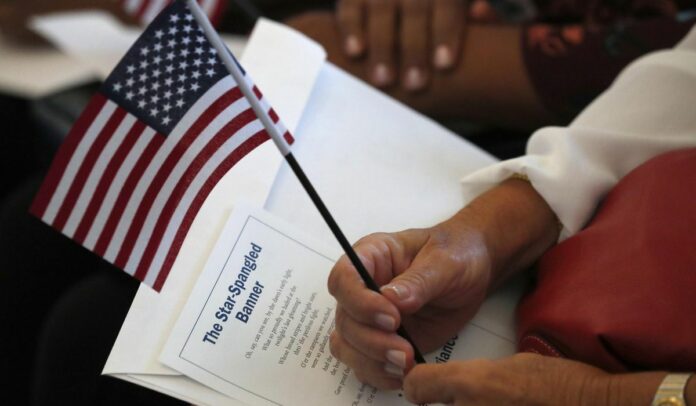The federal agency that handles citizenship and other legal immigration applications is running out of money amid the coronavirus crisis, and warned Congress on Friday it needs a quick infusion of $1.2 billion in taxpayer money or else it will have to take “drastic actions” to keep the doors open.
Joseph Edlow, deputy director for policy at U.S. Citizenship and Immigration Services, told employees in a memo Friday that they’ve already done some belt-tightening and are working on a new fee schedule that will bring in more money.
But it won’t be enough and Congress will have to pony up.
“USCIS will exhaust its funding this summer, and without congressional intervention, we risk not being able to make payroll and will have to take drastic actions to keep the agency afloat,” Mr. Edlow wrote.
The money would be a loan, and it would repay taxpayers through a 10% surcharge on future applications and petitions, Mr. Edlow said, adding that it was important not to add to the deficit or leave taxpayers in the lurch over the long term.
The warning was stunning for a government operation.
USCIS, which is part of the Homeland Security Department, is a rarity in the federal government because it’s almost entirely funded by fees — in this case paid by immigrants and visa seekers when they apply for benefits.
But the agency’s workload has plummeted during the coronavirus pandemic, cutting revenue in half. Without some new source of money, USCIS believes it will run out of money by July 13, and will have to furlough employees.
The agency says it needs $571.2 million for pay and operating expenses for the rest of fiscal year 2020, and wants $650 million more in carryover money in case the crisis extends into 2021. Even that will only maintain “limited operations,” the agency told Congress.
The agency’s fee-funded structure is usually a boon. During government shutdowns, when most other federal departments and agencies either shutter or continue working without pay, USCIS is able to operate as usual because it operates somewhat like a business and its money comes directly from fees.
During the coronavirus crisis, the equation is reversed and, like businesses that depend on income, USCIS is facing a cash crunch. Meanwhile agencies that depend on taxpayers are able to chug along on the money Congress is borrowing.
USCIS does get about 4% of its funding each year from taxpayers to operate E-Verify, a voluntary program that lets businesses check to make sure new hires are legally able to work in the U.S.
And the agency has gotten direct infusions of cash from Congress before, including in the early 2000s, when a massive backlog of cases had built up and lawmakers sent over taxpayer money to staff up and cut into the backlog.
USCIS is fee-funded because there’s long been a consensus that immigrants and businesses that want to bring in guest workers should pay their own way, rather than force taxpayers to foot the bill.
Every couple years, USCIS reviews its fees and can adjust them to bring in more income.
Some Democrats on Capitol Hill in recent years have complained about the increases, and suggested ending the fee-funding structure. That would make taxpayers subsidize immigrants, but it would also give Congress more control over the agency’s decisions.
The Washington Times reached out Friday evening to the chairs of the House and Senate subcommittees that oversee USCIS’s spending, but had yet to receive replies.






